German actor and director Reinhold Schünzel (1888-1953) started his successful film career during the first World War. He helmed and appeared in more than 100 productions, specialising in light comedies such as the classic ‘drag’ farce Viktor und Viktoria/Victor and Victoria (1933). In 1937 he had to flee Nazi Germany and continued his career in Hollywood.

German postcard by Verlag Herm. Leiser, Berlin-Wilm., no. 5070. Photo: Becker & Maass.
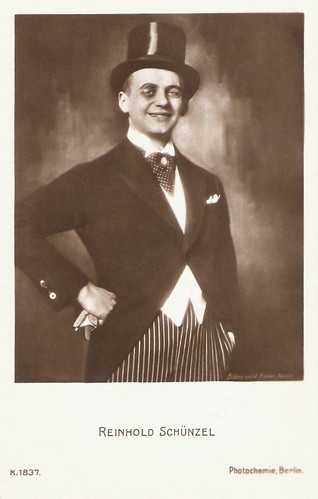
German postcard by Photochemie, Berlin, no. K. 1837. Photo: Alex Binder, Berlin.

German collectors card by Ross Verlag for the album Vom Werden deutscher Filmkunst. Teil I. Der stumme Film (Cigaretten-Bilderdienst Altona-Bahrenfeld 1935), Bild no. 43, Gruppe 41. Photo: Treumann-Larsen-Film. Publicity still for Die Erzkokette/The Superflirt (Franz Eckstein, Rosa Porten, 1917) with left Eduard von Winterstein and Rosa Porten.
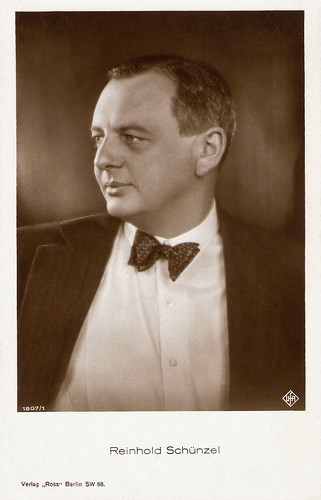
German postcard by Ross Verlag, Berlin, no. 1907/1, 1927-1928. Photo: Ufa.

German postcard by Ross Verlag, no. 6079/1, 1931-1932. Photo: Vandal & Delac. Publicity still for Der Ball/The Ball (Wilhelm Thiele, 1931) with Dolly Haas and Lucie Mannheim.
Reinhold Schünzel was born in Hamburg, Germany, in 1888 (some sources: 1886). After finishing school, he completed an apprenticeship as a merchant in the Berlin-based publishing company Scherl. He then worked in Berlin, later in Hamburg, as a branch manager for the publishing company.
Besides, he worked as a part-time extra in films. He became a full-time actor in 1912. He then performed at Stadttheater Bern and at Berlin's Komödienhaus at Schiffbauerdamm and at Theater at Königgrätzer Straße. His film debut was in Werner Krafft (Carl Froelich, 1916) with Erika Glässner.
In the same year, he was discovered by Richard Oswald. From then on he often played the part of the self-indulgent bonvivant and seducer, the sly pander and extortionist in Oswald's films. He starred in the Aufklärungsfilms (educational film) Das Tagebuch einer Verlorenen/The Diary of a Lost Woman (Richard Oswald, 1918) with Erna Morena, Werner Krauss, and Conrad Veidt, and Das gelbe Haus/Prostitution (Richard Oswald, 1919) starring Anita Berber.
With Veidt, he starred in Anders als die Andern/Different from the Others (Richard Oswald, 1919), where he embodied the blackmailer of a homosexual violinist, played by Veidt. He also appeared as the villain in the crime films of the Max Landa series, such as Das Geheimnis des Amerika-Docks/The Secret of the America Dock (Ewald André Dupont, 1919).
In 1919 he directed his first film, Maria Magdalena/Mary Magdalena (Reinhold Schünzel, 1919) with Lucie Höflich. He followed this up with the Aufklärungsfilm Das Mädchen aus der Ackerstraße/The Girl From the Ackerstrasse (1920) and the elaborate history film Katharina die Große/Catherine the Great (1920).

German postcard by Film-Sterne Verlag, no. 508/4. Photo: Messter. Henny Porten and Reinhold Schünzel in the comedy Höhenluft (Rudolf Biebrach, 1917).

German postcard by Photochemie, Berlin, no. K.2931. Photo: Union. Reinhold Schünzel in Das Karussell des Lebens (Georg Jacoby, 1918). According to German Wikipedia Schünzel's presence in the film is unsure, but this postcard seems to prove it.

German postcard by Rotophot in the Film Sterne series, no. 520/3. Photo: Messter Film. Henny Porten and Reinhold Schünzel in the German silent comedy Auf Probe gestellt (Rudolf Biebrach, 1918).

German postcard by Rotophot in the Film Sterne series, no. 529/6. Photo: Richard Oswald-Film. Erna Morena, Conrad Veidt and Reinhold Schünzel in Das Tagebuch einer Verlorenen/The Diary of a Lost Woman (Richard Oswald, 1918).

German postcard by Ross Verlag, Berlin, no. 616/2. Photo: Richard-Oswald-Film. Reinhold Schünzel and Ilka Grüning in Die sich verkaufen, part 2 of the series Prostitution (Richard Oswald, 1919).

German postcard by Ross Verlag, no. 627/6. Photo: Union Film. Reinhold Schünzel and Pola Negri in Madame DuBarry (Ernst Lubitsch, 1919). After the death of King Louis XV (Emil Jannings), his minister Choiseul (Schünzel) chases DuBarry (Negri) from the Royal palace.
Still, in 1920, Reinhold Schünzel set up the production company Schünzel-Film and merged it several months later with the Vienna-based production company Micheluzzo & Co. (Micco-Film). The new production company then produced Der Graf von Cagliostro/The Count of Cagliostro (1920), starring Conrad Veidt and Anita Berber. Schünzel helmed the film as a producer, director, and actor.
Schünzel also starred in ambitious productions like Madame Dubarry/Passion (Ernst Lubitsch, 1919) starring Pola Negri, and the Friedrich Schiller adaption Luise Millerin (Carl Froelich, 1922) featuring Lil Dagover.
From the second half of the 1920s on, he specialised as a director in light comedies. He displayed his full comedic potential in films such as Adam und Eva/Adam and Eve (1923), Halloh Caesar!/Hello Cesar! (1926), and Don Juan in der Mädchenschule/Don Juan in the Girl’s School (1928) with Adolphe Engers.
Even when he was at his busiest as a director, Schünzel found time to act in other men's films, notably Georg Wilhelm Pabst’s adaptation of Die 3-Groschen-Oper/The Beggar's Opera (G.W. Pabst, 1931), in which he played crooked constable Tiger Brown.
With the introduction of the sound film his comic talent as a director came even to a better advantage. From 1931 on, Schünzel worked as a director for Ufa and finished a number of very successful musical films, including Saison in Kairo/Cairo Season (1933), the classic ‘drag’ farce Viktor und Viktoria/Victor and Victoria (1933), and Amphitryon - the clouds comes from the happiness/Amphitryon – Aus den Wolken kommt das Glück (1935). In all these films, Renate Müller played the leading role.
Schünzel also directed the simultaneously film French-language version of Viktor und Viktoria: George et Georgette (Roger Le Bon, Reinhold Schünzel, 1933) starring Meg Lemonnier. Viktor und Viktoria would also lead to such remakes as Victor, Victoria (Blake Edwards, 1981) starring Julie Andrews.
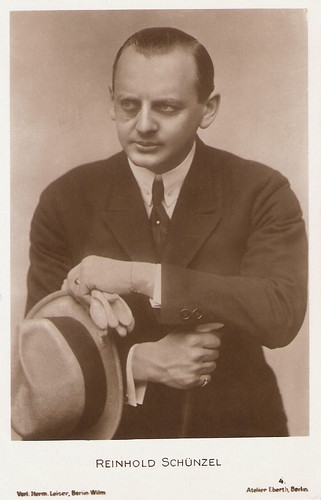
German postcard by Herm. Leiser, Berlin-Wilm. Photo: Atelier Eberth, Berlin.

German postcard by Ross Verlag, no. 386/1. Photo: Riess.
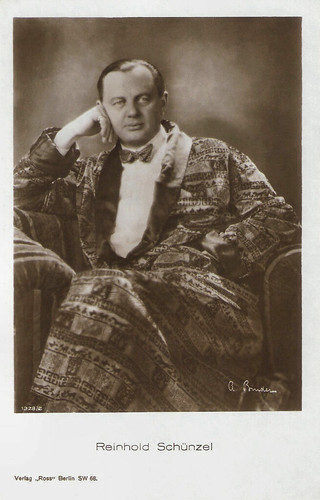
German postcard by Ross Verlag, no. 1328/2, 1927-1928. Photo: Alex Binder.

German postcard by Ross Verlag, no. 1328/3, 1927-1928. Photo: Alex Binder.

German postcard by Ross Verlag, no. 1585/2, 1927-1928. Photo: Ufa.
After 1933, Reinhold Schünzel was only by special permission of the Nazis allowed to work because he was described as ‘half-Jew’. Though he tried to make the best of things after Adolph Hitler's ascent to power, the ironic undertone of his films eventually got Schünzel in trouble with the Nazi regime. There were so many interventions in his films that he left the country after finishing Land der Liebe/Land of Love (1937) with Albert Matterstock.
He resettled in Hollywood. His American directorial debut was Rich Man Poor Girl (1938). Although the three musical films he made for MGM were quite successful - the others were Balalaika (1939) and The Ice Follies of 1939 (1939) - and featured stars like Joan Crawford and James Stewart, Schünzel was not able to make his breakthrough in Hollywood. Thus, New Wine (1941) happened to be his last film as a director.
From then on he concentrated solely on playing character roles. He appeared as a Nazi villain in major films as Hangmen Also Die! (Fritz Lang, 1943) and Notorious (Alfred Hitchcock, 1946). Amidst the requisite Nazis and Professorial types, Schünzel enjoyed one of his best-ever screen roles in Paramount's The Man in Half-Moon Street (Ralph Murphy, 1945), playing the conscience-stricken associate of murderous ‘eternal-life’ experimenter Nils Asther.
In 1949 (some sources say 1952) he returned to Germany and worked again at on stage in Munich, as he appeared as a supporting actor in films. For his role in Meines Vaters Pferde/My father's horses (Gerhard Lamprecht, 1954), he received the Bundesfilmpreis (Federal Film Award) as Best Male Supporting Actor.
Shortly after, Reinhold Schünzel died in Munich of heart disease. He was the father of Marianne Stewart. On the occasion of Schünzel’s 100th Birthday in 1988, CineGraph – the Hamburg Institute Center for Film Research dedicated a congress to the work of the director and actor.
Subsequently a biography was published: Reinhold Schunzel: Schaupieler und Regisseur (1989), by Hans-Michael Bock, Wolfgang Jacobson, and Joerg Schoening. The publication inspired Hans-Christoph Blumenberg to make a film about Schünzel, Beim nächsten Kuß knall ich ihn nieder!/The Next Kiss I’ll Shoot Him! (1995). Since 2004 CineFest, the International Festival of German Film Heritage has the Reinhold Schünzel Award, a yearly honorary award for long service to the care, preservation, and dissemination of the German film heritage.

German postcard by Ross Verlag, Berlin, no. 361/1. Photo: Alex Binder, Berlin.
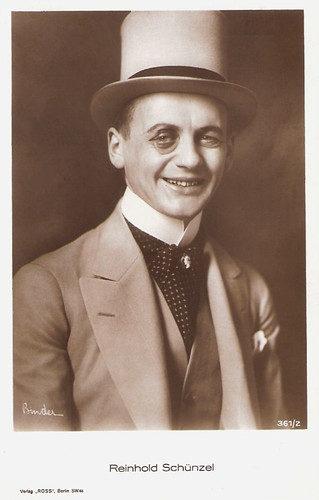
German postcard by Ross Verlag, Berlin, no. 361/2. Photo: Alex Binder, Berlin.
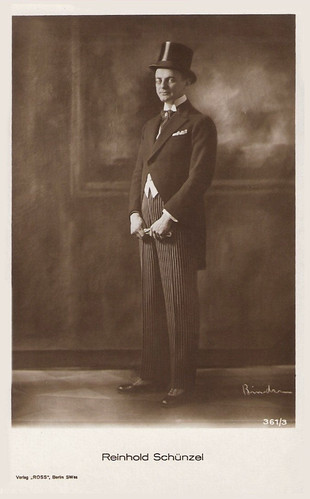
German postcard by Ross Verlag, Berlin, no. 361/3, 1919-1924. Photo: Alex Binder.

German postcard by Ross Verlag / W.J, Mörling, Berlin, no. 391/2. Photo: Karl Schenker, Berlin.

German postcard by Deutsche London Film. Photo: Intercontinental-Film / London-Film / Lilo.
Sources: Hal Erickson (AllMovie), Thomas Staedeli (Cyranos), Filmportal.de, TCM, Wikipedia (German), and IMDb.
This post was last updated on 11 April 2021.

German postcard by Verlag Herm. Leiser, Berlin-Wilm., no. 5070. Photo: Becker & Maass.

German postcard by Photochemie, Berlin, no. K. 1837. Photo: Alex Binder, Berlin.

German collectors card by Ross Verlag for the album Vom Werden deutscher Filmkunst. Teil I. Der stumme Film (Cigaretten-Bilderdienst Altona-Bahrenfeld 1935), Bild no. 43, Gruppe 41. Photo: Treumann-Larsen-Film. Publicity still for Die Erzkokette/The Superflirt (Franz Eckstein, Rosa Porten, 1917) with left Eduard von Winterstein and Rosa Porten.

German postcard by Ross Verlag, Berlin, no. 1907/1, 1927-1928. Photo: Ufa.

German postcard by Ross Verlag, no. 6079/1, 1931-1932. Photo: Vandal & Delac. Publicity still for Der Ball/The Ball (Wilhelm Thiele, 1931) with Dolly Haas and Lucie Mannheim.
Self-indulgent bonvivant and seducer
Reinhold Schünzel was born in Hamburg, Germany, in 1888 (some sources: 1886). After finishing school, he completed an apprenticeship as a merchant in the Berlin-based publishing company Scherl. He then worked in Berlin, later in Hamburg, as a branch manager for the publishing company.
Besides, he worked as a part-time extra in films. He became a full-time actor in 1912. He then performed at Stadttheater Bern and at Berlin's Komödienhaus at Schiffbauerdamm and at Theater at Königgrätzer Straße. His film debut was in Werner Krafft (Carl Froelich, 1916) with Erika Glässner.
In the same year, he was discovered by Richard Oswald. From then on he often played the part of the self-indulgent bonvivant and seducer, the sly pander and extortionist in Oswald's films. He starred in the Aufklärungsfilms (educational film) Das Tagebuch einer Verlorenen/The Diary of a Lost Woman (Richard Oswald, 1918) with Erna Morena, Werner Krauss, and Conrad Veidt, and Das gelbe Haus/Prostitution (Richard Oswald, 1919) starring Anita Berber.
With Veidt, he starred in Anders als die Andern/Different from the Others (Richard Oswald, 1919), where he embodied the blackmailer of a homosexual violinist, played by Veidt. He also appeared as the villain in the crime films of the Max Landa series, such as Das Geheimnis des Amerika-Docks/The Secret of the America Dock (Ewald André Dupont, 1919).
In 1919 he directed his first film, Maria Magdalena/Mary Magdalena (Reinhold Schünzel, 1919) with Lucie Höflich. He followed this up with the Aufklärungsfilm Das Mädchen aus der Ackerstraße/The Girl From the Ackerstrasse (1920) and the elaborate history film Katharina die Große/Catherine the Great (1920).

German postcard by Film-Sterne Verlag, no. 508/4. Photo: Messter. Henny Porten and Reinhold Schünzel in the comedy Höhenluft (Rudolf Biebrach, 1917).

German postcard by Photochemie, Berlin, no. K.2931. Photo: Union. Reinhold Schünzel in Das Karussell des Lebens (Georg Jacoby, 1918). According to German Wikipedia Schünzel's presence in the film is unsure, but this postcard seems to prove it.

German postcard by Rotophot in the Film Sterne series, no. 520/3. Photo: Messter Film. Henny Porten and Reinhold Schünzel in the German silent comedy Auf Probe gestellt (Rudolf Biebrach, 1918).

German postcard by Rotophot in the Film Sterne series, no. 529/6. Photo: Richard Oswald-Film. Erna Morena, Conrad Veidt and Reinhold Schünzel in Das Tagebuch einer Verlorenen/The Diary of a Lost Woman (Richard Oswald, 1918).

German postcard by Ross Verlag, Berlin, no. 616/2. Photo: Richard-Oswald-Film. Reinhold Schünzel and Ilka Grüning in Die sich verkaufen, part 2 of the series Prostitution (Richard Oswald, 1919).

German postcard by Ross Verlag, no. 627/6. Photo: Union Film. Reinhold Schünzel and Pola Negri in Madame DuBarry (Ernst Lubitsch, 1919). After the death of King Louis XV (Emil Jannings), his minister Choiseul (Schünzel) chases DuBarry (Negri) from the Royal palace.
Classic Drag Farce
Still, in 1920, Reinhold Schünzel set up the production company Schünzel-Film and merged it several months later with the Vienna-based production company Micheluzzo & Co. (Micco-Film). The new production company then produced Der Graf von Cagliostro/The Count of Cagliostro (1920), starring Conrad Veidt and Anita Berber. Schünzel helmed the film as a producer, director, and actor.
Schünzel also starred in ambitious productions like Madame Dubarry/Passion (Ernst Lubitsch, 1919) starring Pola Negri, and the Friedrich Schiller adaption Luise Millerin (Carl Froelich, 1922) featuring Lil Dagover.
From the second half of the 1920s on, he specialised as a director in light comedies. He displayed his full comedic potential in films such as Adam und Eva/Adam and Eve (1923), Halloh Caesar!/Hello Cesar! (1926), and Don Juan in der Mädchenschule/Don Juan in the Girl’s School (1928) with Adolphe Engers.
Even when he was at his busiest as a director, Schünzel found time to act in other men's films, notably Georg Wilhelm Pabst’s adaptation of Die 3-Groschen-Oper/The Beggar's Opera (G.W. Pabst, 1931), in which he played crooked constable Tiger Brown.
With the introduction of the sound film his comic talent as a director came even to a better advantage. From 1931 on, Schünzel worked as a director for Ufa and finished a number of very successful musical films, including Saison in Kairo/Cairo Season (1933), the classic ‘drag’ farce Viktor und Viktoria/Victor and Victoria (1933), and Amphitryon - the clouds comes from the happiness/Amphitryon – Aus den Wolken kommt das Glück (1935). In all these films, Renate Müller played the leading role.
Schünzel also directed the simultaneously film French-language version of Viktor und Viktoria: George et Georgette (Roger Le Bon, Reinhold Schünzel, 1933) starring Meg Lemonnier. Viktor und Viktoria would also lead to such remakes as Victor, Victoria (Blake Edwards, 1981) starring Julie Andrews.

German postcard by Herm. Leiser, Berlin-Wilm. Photo: Atelier Eberth, Berlin.

German postcard by Ross Verlag, no. 386/1. Photo: Riess.

German postcard by Ross Verlag, no. 1328/2, 1927-1928. Photo: Alex Binder.

German postcard by Ross Verlag, no. 1328/3, 1927-1928. Photo: Alex Binder.

German postcard by Ross Verlag, no. 1585/2, 1927-1928. Photo: Ufa.
Half-Jew
After 1933, Reinhold Schünzel was only by special permission of the Nazis allowed to work because he was described as ‘half-Jew’. Though he tried to make the best of things after Adolph Hitler's ascent to power, the ironic undertone of his films eventually got Schünzel in trouble with the Nazi regime. There were so many interventions in his films that he left the country after finishing Land der Liebe/Land of Love (1937) with Albert Matterstock.
He resettled in Hollywood. His American directorial debut was Rich Man Poor Girl (1938). Although the three musical films he made for MGM were quite successful - the others were Balalaika (1939) and The Ice Follies of 1939 (1939) - and featured stars like Joan Crawford and James Stewart, Schünzel was not able to make his breakthrough in Hollywood. Thus, New Wine (1941) happened to be his last film as a director.
From then on he concentrated solely on playing character roles. He appeared as a Nazi villain in major films as Hangmen Also Die! (Fritz Lang, 1943) and Notorious (Alfred Hitchcock, 1946). Amidst the requisite Nazis and Professorial types, Schünzel enjoyed one of his best-ever screen roles in Paramount's The Man in Half-Moon Street (Ralph Murphy, 1945), playing the conscience-stricken associate of murderous ‘eternal-life’ experimenter Nils Asther.
In 1949 (some sources say 1952) he returned to Germany and worked again at on stage in Munich, as he appeared as a supporting actor in films. For his role in Meines Vaters Pferde/My father's horses (Gerhard Lamprecht, 1954), he received the Bundesfilmpreis (Federal Film Award) as Best Male Supporting Actor.
Shortly after, Reinhold Schünzel died in Munich of heart disease. He was the father of Marianne Stewart. On the occasion of Schünzel’s 100th Birthday in 1988, CineGraph – the Hamburg Institute Center for Film Research dedicated a congress to the work of the director and actor.
Subsequently a biography was published: Reinhold Schunzel: Schaupieler und Regisseur (1989), by Hans-Michael Bock, Wolfgang Jacobson, and Joerg Schoening. The publication inspired Hans-Christoph Blumenberg to make a film about Schünzel, Beim nächsten Kuß knall ich ihn nieder!/The Next Kiss I’ll Shoot Him! (1995). Since 2004 CineFest, the International Festival of German Film Heritage has the Reinhold Schünzel Award, a yearly honorary award for long service to the care, preservation, and dissemination of the German film heritage.

German postcard by Ross Verlag, Berlin, no. 361/1. Photo: Alex Binder, Berlin.

German postcard by Ross Verlag, Berlin, no. 361/2. Photo: Alex Binder, Berlin.

German postcard by Ross Verlag, Berlin, no. 361/3, 1919-1924. Photo: Alex Binder.

German postcard by Ross Verlag / W.J, Mörling, Berlin, no. 391/2. Photo: Karl Schenker, Berlin.

German postcard by Deutsche London Film. Photo: Intercontinental-Film / London-Film / Lilo.
Sources: Hal Erickson (AllMovie), Thomas Staedeli (Cyranos), Filmportal.de, TCM, Wikipedia (German), and IMDb.
This post was last updated on 11 April 2021.
No comments:
Post a Comment